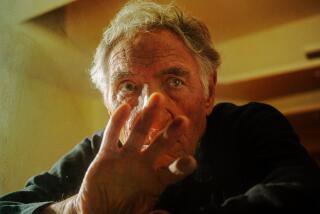Film Producer Joe Pasternak Dies at 89
- Share via
Joe Pasternak, the masterful producer of film musicals whose 105 pictures reflected his own Old Country taste and optimism, has died at his Beverly Hills home.
His son, Peter, said Monday that his father was six days short of his 90th birthday when he died Friday.
In a career that spanned 40 years, Pasternak developed such musical prodigies as Deanna Durbin, Judy Garland, Kathryn Grayson and Gloria DeHaven.
The 10 films he made with Durbin were credited with saving financially ailing Universal Pictures while his casting of Marlene Dietrich as a dance-hall temptress rescued her faltering career.
His picture credits read like a lexicon of melodic and comedic classics: “Destry Rides Again,” “The Flame of New Orleans,” “Thousands Cheer,” “Anchors Aweigh,” “That Midnight Kiss,” “The Toast of New Orleans,” “The Merry Widow,” “The Great Caruso,” “The Student Prince,” “Love Me or Leave Me,” “Hit the Deck,” “Where the Boys Are,” “Jumbo” and “The Courtship of Eddie’s Father.”
Parkinson’s disease ended his career. His films earned $400 million in an era when admission to most movie theaters was well under $1 and there were no video residuals.
“If I’d had a percentage,” he said in a 1980 Times interview, “I’d be the richest man in town.”
But that was not a complaint, he hastened to add, just a comment. For Pasternak wore a perennial smile, both pleased and proud of his family, his awards for humanitarian service and most of all his pictures.
“Keep the people nice,” was his motto. “I have produced 105 movies and not a one was for adults only,” he would say when critics complained of his often saccharine films. But critics bought few if any tickets while his public purchased millions.
Born in Szilagy-Smolyo, (a town that even Pasternak admitted defied pronunciation) in Hungary, the future producer said his boyhood dream was to “have my own bathroom.” He came to the United States while still in his teens, worked in a factory in Philadelphia and then studied acting in New York.
When he applied for a job at Paramount’s studios in Long Island, he was hired--but as a dishwasher.
By 1923, however, he had worked his way upward to a fourth assistant director under Allan Dwan at $16 a week, and three years later moved to Universal, which sent him back to Europe as an associate producer in the company’s Berlin operations.
There he began to produce the musical films that became his signature and that were to help launch the careers of Mario Lanza, Gene Kelly, Esther Williams and Doris Day.
He made seven films in Berlin, moved to Vienna after the rise of Adolf Hitler for two more and then to his native Hungary for four others.
In the mid-1930s Carl Laemmle’s Universal Pictures was on the verge of bankruptcy and its European operations were closed.
He returned to the United States along with director Henry Koster and instead of being asked to make lavish pictures in exchange for his then $1,500 a week salary, was asked--with Koster--to take a routine B script and return it as an inexpensive production.
The script was “Three Smart Girls,” and it made a star of 15-year-old soprano Deanna Durbin.
Her rendition of three songs: “Il Bacio,” “My Heart Is Singing” and “Someone to Care for Me,” made her a household name and revitalized the Universal coffers.
Next he cast Durbin in “One Hundred Men and a Girl,” the 100 men being the Philadelphia Orchestra conducted by Leopold Stokowski. It is considered the classic Pasternak melding of sweetness and music.
He also cast Dietrich in “Destry Rides Again,” in which she sang the classic “See What the Boys in the Back Room Will Have.” The role of the saucy saloon queen Frenchie revived what had been a listless career.
In 1941 Joe Pasternak--who eschewed the more formal “Joseph” in his credits (“I did it before Jimmy Carter,” he liked to say)--moved to Metro-Goldwyn-Mayer where his string of musical magic began in earnest.
He teamed Frank Sinatra with Gene Kelly and Kathryn Grayson in “Anchors Aweigh,” Van Johnson with June Allyson and Gloria DeHaven in “Two Girls and a Sailor.” Tenor Mario Lanza became an overnight screen sensation with “That Midnight Kiss” followed by “The Toast of New Orleans” and “The Great Caruso,” and Elizabeth Taylor moved into her late teens in “A Date With Judy.”
He carried his interest in teen-age films into the 1960s when he made “Where the Boys Are,” a Ft. Lauderdale beach adventure that generated a multitude of imitators.
As Pasternak aged he came to defend the studio moguls who had employed him and the system in which they all operated. “It perfected actors through training,” he said in 1980.
Survivors include his wife, Dorothy, three sons, a brother and two sisters. A funeral service will be held at noon today at Hillside Memorial Park. Private burial will follow.
More to Read
Only good movies
Get the Indie Focus newsletter, Mark Olsen's weekly guide to the world of cinema.
You may occasionally receive promotional content from the Los Angeles Times.










